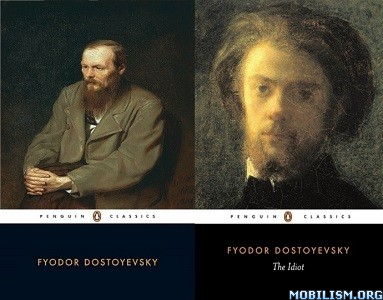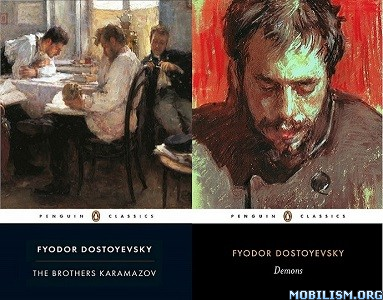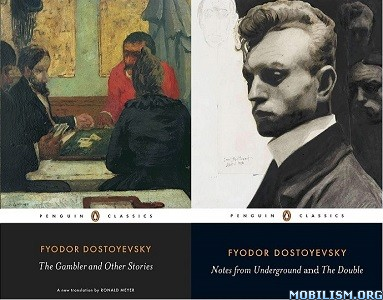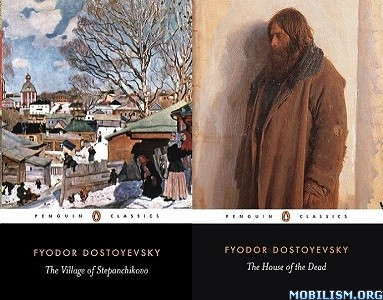7 Books (Penguin Classics Editions) by Fyodor Dostoyevsky (Dostoevsky)
Requirements: .ePUB, .MOBI/.AZW reader, 80mb
Overview: Fyodor Mikhailovich Dostoevsky was a Russian novelist, short story writer, essayist, and journalist. His literary works explore human psychology in the troubled political, social, and spiritual atmospheres of 19th-century Russia, and engage with a variety of philosophical and religious themes. Many literary critics rate him as one of the greatest novelists in all of world literature, as multiple of his works are considered highly influential masterpieces.
Genre: Fiction > General Fiction/Classics
Demons (Penguin Classics)
by Fyodor Dostoevsky (Author), Ronald Meyer (Editor), Robert A. Maguire (Translator), Robert Belknap (Introduction)
A superb new translation of Dostoyevsky’s chilling and prophetic novel of revolutionary fanaticism.
Pyotr and Stavrogin are the leaders of a Russian revolutionary cell. Their aim is to overthrow the Tsar, destroy society, and seize power for themselves. Together they train terrorists who are willing to lay down their lives to accomplish their goals. But when the group is threatened with exposure, will their recruits be willing to kill one of their own to cover their tracks? Savage and powerful yet lively and often comic, Demons was inspired by a real-life political murder and is a scathing and eerily prescient indictment of those who use violence to serve their beliefs.
Notes from Underground and the Double (Penguin Classics)
by Fyodor Dostoyevsky (Author), Jessie Coulson (Translation, Introduction)
‘It is best to do nothing! The best thing is conscious inertia! So long live the underground!’Alienated from society and paralysed by a sense of his own insignificance, the anonymous narrator of Dostoyevsky’s groundbreaking Notes from Underground tells the story of his tortured life. With bitter sarcasm, he describes his refusal to become a worker in the ‘ant-hill’ of society and his gradual withdrawal to an existence ‘underground’. The seemingly ordinary world of St Petersburg takes on a nightmarish quality in The Double when a government clerk encounters a man who exactly resembles him – his double perhaps, or possibly the darker side of his own personality. Like Notes from Underground, this is a masterly study of human consciousness.Jessie Coulson’s introduction discusses the stories’ critical reception and the themes they share with Dostoyevksy’s great novels.
The Brothers Karamazov (Penguin Classics)
by Fyodor Dostoyevsky (Author), David McDuff (Translation, Introduction, Notes)
A tragedy of Shakespearean force and intensity, Dostoyevsky’s drama of parricide and family rivalry chronicles the murder of depraved landowner Fyodor Karamazov and the subsequent investigation and trial. Extensive notes explain the many literary and topical allusions and provide background information.
The Gambler and Other Stories (Penguin Classics)
by Fyodor Dostoyevsky (Author), Ronald Meyer (Translation, Introduction, Notes)
The Gambler and Other Stories is Fyodor Dostoyevsky’s collection of one novella and six short stories reflecting his own life – indeed, ‘The Gambler’, a story of a young tutor in the employment of a formerly wealthy Russian General, was written under a strict deadline so he could pay off his roulette debts. This volume includes ‘Bobok’, the tale of a frustrated writer visiting a cemetery and enjoying the gossip of the dead; ‘The Dream of a Ridiculous Man’, the story of one man’s plan to commit suicide and the troubling dream that follows, as well as ‘A Christmas Party and a Wedding’, ‘A Nasty Story’ and ‘The Meek One’.
The House of the Dead (Penguin Classics)
by Fyodor Dostoyevsky (Author), David McDuff (Translation, Introduction)
In January 1850 Dostoyevsky was sent to a remote Siberian prison camp for his part in a political conspiracy. The four years he spent there, startlingly re-created in The House of the Dead, were the most agonizing of his life. In this fictionalized account he recounts his soul-destroying incarceration through the cool, detached tones of his narrator, Aleksandr Petrovich Goryanchikov: the daily battle for survival, the wooden plank beds, the cabbage soup swimming with cockroaches, his strange ‘family’ of boastful, ugly, cruel convicts. Yet The House of the Dead is far more than a work of documentary realism: it is also a powerful novel of redemption, describing one man’s spiritual and moral death and the miracle of his gradual reawakening.
The Idiot (Penguin Classics)
by Fyodor Dostoyevsky (Author), David McDuff (Translator), William Mills Todd (Introduction)
The most autobiographical novel by the author of Crime and Punishment and The Brothers Karamazov—and the namesake of Elif Batuman’s debut novel, The Idiot
Returning to St Petersburg from a Swiss sanatorium, the gentle and naïve epileptic Prince Myshkin— known as the “idiot”—pays a visit to his distant relative General Yepanchin and proceeds to charm the General and his family. But his life is thrown into turmoil when he chances on a photograph of the beautiful Nastasya Filippovna. Utterly infatuated, he soon finds himself caught up in a love triangle and drawn into a web of blackmail, betrayal, and finally, murder. In Prince Myshkin, Dostoyevsky portrays the purity of “a truly beautiful soul” and explores the perils that innocence and goodness face in a corrupt world.
The Village of Stepanchikovo: And its Inhabitants: From the Notes of an Unknown (Penguin Classics)
by Fyodor Dostoyevsky (Author), Ignat Avsey (Translator, Introduction)
Summoned to the country estate of his wealthy uncle Colonel Yegor Rostanev, the young student Sergey Aleksandrovich finds himself thrown into a startling bedlam. For as he soon sees, his meek and kind-hearted uncle is wholly dominated by a pretentious and despotic pseudo-intellectual named Opiskin, a charlatan who has ingratiated himself with Yegor’s mother and now holds the entire household under his thumb. Watching the absurd theatrics of this domestic tyrant over forty-eight explosive hours, Sergey grows increasingly furious – until at last, he feels compelled to act. A compelling comic exploration of petty tyranny, The Village of Stepanchikovo reveals a delight in life’s wild absurdities that rivals even Gogol’s. It also offers a fascinating insight into the genesis of the characters and situations of many of Dostoyevsky’s great later novels, including The Idiot, Devils and The Brothers Karamazov.
Download Instructions:
Demons
https://ouo.io/qVI38d
https://ouo.io/89fYF8
Notes from Underground and the Double
https://ouo.io/8MWhSg
https://ouo.io/CE0IsPh
The Brothers Karamazov
https://ouo.io/Uif6SJ
https://ouo.io/KPtAxK
The Gambler and Other Stories
https://ouo.io/usmnK8
https://ouo.io/XXV3R2D
The House of the Dead
https://ouo.io/Y48T8b
https://ouo.io/WtRJ1u
The Idiot
https://ouo.io/ccVh65
https://ouo.io/YPEi2ue
The Village of Stepanchikovo
https://ouo.io/Q0i2bz
https://ouo.io/eWSK5DI




